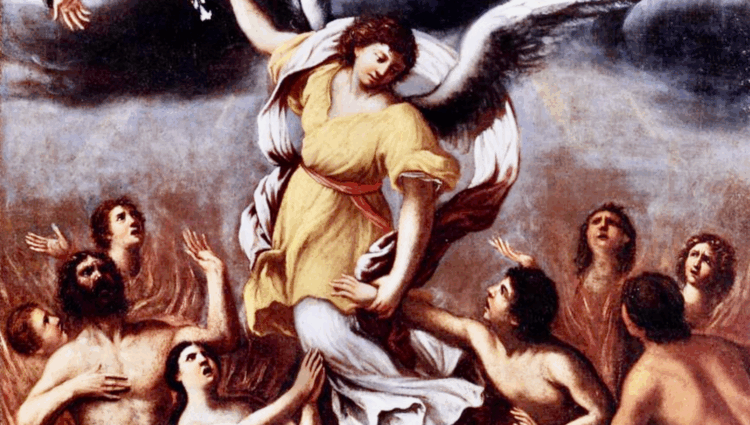**Grace, Purgatory, and the Feast of All Souls**
Grace alone determines whether we go to Heaven or Hell. However, our good works influence whether we undergo purgation on the path to Heaven.
—
**November 2: The Feast of All Souls**
November 2 is the Feast of All Souls. The purpose of this day is to remember those who have passed before us—not necessarily the saints, who are already in Heaven. All Saints Day, celebrated on November 1, honors those who have attained Heaven. In contrast, November 2 encourages us to remember those souls in Purgatory.
The Catholic Catechism provides a profound explanation of this tradition:
– **Catechism 1030:**
“All who die in God’s grace and friendship, but still imperfectly purified, are indeed assured of their eternal salvation; but after death they undergo purification, so as to achieve the holiness necessary to enter the joy of heaven.”
– **Catechism 1031:**
“The Church gives the name Purgatory to this final purification of the elect, which is entirely different from the punishment of the damned. The Church formulated her doctrine of faith on Purgatory especially at the Councils of Florence and Trent. The tradition of the Church, by reference to certain texts of Scripture, speaks of a cleansing fire. As for certain lesser faults, we must believe that, before the Final Judgment, there is a purifying fire.”
– **Catechism 1032:**
“This teaching is also based on the practice of prayer for the dead, already mentioned in Sacred Scripture: ‘Therefore [Judas Maccabeus] made atonement for the dead, that they might be delivered from their sin.’ From the beginning the Church has honored the memory of the dead and offered prayers in suffrage for them, above all the Eucharistic sacrifice, so that, thus purified, they may attain the beatific vision of God.”
The Church also commends almsgiving, indulgences, and works of penance undertaken on behalf of the dead:
> “Let us help and commemorate them. If Job’s sons were purified by their father’s sacrifice, why would we doubt that our offerings for the dead bring them some consolation? Let us not hesitate to help those who have died and to offer our prayers for them.”
—
**Biblical Roots of Prayers for the Dead**
Praying for the dead originated in the Jewish and Hebraic traditions. Specifically, this is found in **2 Maccabees 12:43-46** (New English Translation):
> “The noble Judas called on the people to keep themselves free from sin, for they had seen with their own eyes what had happened to the fallen because of their sin. He levied a contribution from each man, and sent the total of two thousand silver drachmas to Jerusalem for a sin-offering—a fit and proper act, in which they took due account of the resurrection. For if he had not been expecting the fallen to rise again, it would have been foolish and superfluous to pray for the dead. But since he had in view the wonderful reward reserved for those who die a godly death, his purpose was a holy and pious one. And this is why he offered an atoning sacrifice to free the dead from their sin.”
—
**Our Connection with Those in Purgatory**
Those in Purgatory are our brothers and sisters, members of the larger and mystical Body of Christ. They call for our prayers. In fact, we are spiritually linked to them—even more closely than to those already in Heaven.
Like us, they are pilgrims on the journey to Heaven. Though they have passed beyond death, they remain on this side of Heaven, undergoing purification.
—
**Purgatory in Modern Culture**
From the perspective of modern culture, movies like *Groundhog Day* or *The Sixth Sense* can be seen as artistic reflections of the concept of Purgatory.
It is important to remember the following points about Purgatory:
—
### 1. Purgatory Is Likely a Process, Not a Place
Purgatory is the process of purgation—that is, purification. This belief traces back, in many ways, to ancient Greek philosophy. Philosophers such as Plato and Aristotle argued that for something pure to remain pure, only purity could enter it. Heaven is pure, so anyone entering must be pure as well.
Unless a person achieves purity through martyrdom, cleansing is necessary. Scripturally, St. Paul speaks of passing through “the fire,” as he states in **1 Corinthians 3:11-16** (New English Version):
> “There can be no other foundation beyond that which is already laid; I mean Jesus Christ himself. If anyone builds on that foundation with gold, silver, and fine stone, or with wood, hay, and straw, the work that each man does will at last be brought to light; the day of judgment will expose it. For that day dawns in fire, and the fire will test the worth of each man’s work. If a man’s building stands, he will be rewarded; if it burns, he will have to bear the loss; and yet he will escape with his life, as one might from a fire.”
For those preferring a more Protestant-friendly version, here is the passage from the **King James Version**:
> “For other foundation can no man lay than that is laid, which is Jesus Christ. Now if any man build upon this foundation gold, silver, precious stones, wood, hay, stubble; Every man’s work shall be made manifest: for the day shall declare it, because it shall be revealed by fire; and the fire shall try every man’s work of what sort it is. If any man’s work abide which he hath built thereupon, he shall receive a reward. If any man’s work shall be burned, he shall suffer loss: but he himself shall be saved; yet so as by fire.”
Another scriptural image is found in **1 Peter 3:18-22**, describing Jesus descending to the dead:
> “For Christ also died for our sins once and for all. He, the just, suffered for the unjust, to bring us to God. In the body he was put to death; in the spirit he was brought to life. And in the spirit he went and made his proclamation to the imprisoned spirits… and in the ark a few persons, eight in all, were brought to safety through the water.”
Grace, and grace alone, determines whether we go to Heaven or Hell. However, as St. James teaches, “faith without works is dead.” Our good works determine whether we go through purgation on our way to Heaven.
Once accepted by the Blessed Trinity through grace, one cannot go to Hell. Therefore, no one passes from Purgatory to Hell; the only possible destination after Purgatory is Heaven.
—
### 2. We Must Be Perfect to Enter Heaven
**Revelation 21:26-27** makes this clear:
> “They will bring the grandeur and the wealth of the nations into it, but nothing ritually unclean will ever enter into it, nor anyone who does what is detestable or practices falsehood, but only those whose names are written in the Lamb’s book of life.”
St. Paul also echoes this in **1 Corinthians 15:50-56**:
> “Flesh and blood cannot inherit the kingdom of God, nor does the perishable inherit the imperishable. Listen, I will tell you a mystery: We will not all sleep, but we will all be changed—in a moment, in the blinking of an eye, at the last trumpet… Now when this perishable puts on the imperishable, and this mortal puts on immortality, then the saying that is written will happen: ‘Death has been swallowed up in victory.’”
Someone with only venial sins can go through purgation and enter Heaven. Someone with mortal sins cannot—having seriously offended God.
As described in **1 John 5:16-20** (New English):
> “There is such a thing as deadly sin, and I do not suggest that he should pray about that; but although all wrongdoing is sin, not all sin is deadly sin.”
For a King James Version perspective:
> “There is a sin unto death: I do not say that he shall pray for it. All unrighteousness is sin: and there is a sin not unto death.”
An analogy would be a child who throws a rock through a window. The owner may forgive the child but still expects restitution. Similarly, mortal sin requires greater reconciliation.
—
### 3. Suffering Is Part of Sanctification
Suffering is expected—it completes our transformation into likeness with Christ (Sanctification).
Even St. Paul acknowledged this in his letter to the Philippians (**3:12-14**):
> “My aim is to know him, to experience the power of his resurrection, to share in his sufferings, and to be like him in his death, and so, somehow, to attain to the resurrection from the dead… I do not consider myself to have attained this, but I strive to lay hold of that for which Christ Jesus also laid hold of me.”
He also writes in **Romans 5:2-5**:
> “Let us exult in the hope of the divine splendour that is to be ours. More than this: let us even exult in our present sufferings, because we know that suffering trains us to endure, and endurance brings proof that we have stood the test, and this proof is the ground of hope.”
Colossians 1:24 emphasizes rejoicing in sufferings as part of Christ’s body:
> “Now I rejoice in my sufferings for you, and I fill up in my physical body for the sake of his body, the church what is lacking in the sufferings of Christ.”
Hebrews 12:5-13 offers additional wisdom:
> “And have you forgotten the exhortation addressed to you as sons? ‘My son, do not scorn the Lord’s discipline or give up when he corrects you. For the Lord disciplines the one he loves and chastises every son he accepts.’… Now all discipline seems painful at the time, not joyful. But later it produces the fruit of peace and righteousness for those trained by it.”
—
**Conclusion**
While some may choose to ignore or deny Purgatory, the Catholic Church can robustly defend the doctrine with strong scriptural and historical support.
Christians have prayed for the dead since the earliest days of the Church, a practice rooted in Jewish tradition. If souls went directly to Heaven or Hell immediately after death, praying for the dead would be unnecessary. Yet this tradition persists as a meaningful and hopeful act.
—
*The Imaginative Conservative* embraces the principle of appreciation in cultural and political discussions, encouraging dialogue marked by magnanimity rather than mere civility. To continue supporting this refreshing oasis within today’s often contentious discourse, please consider donating now.
https://theimaginativeconservative.org/2025/11/purgatory-beauty-suffering-scriptural-defense-bradley-birzer.html



